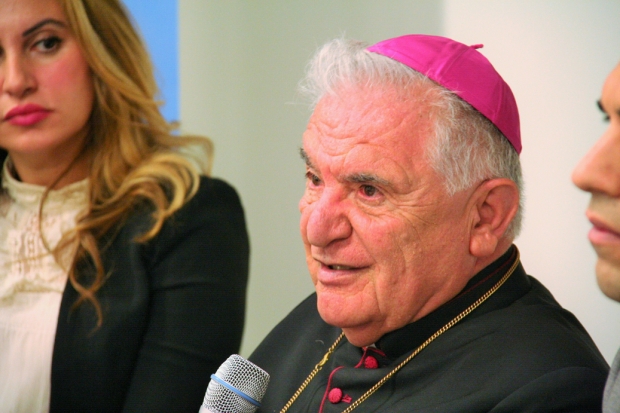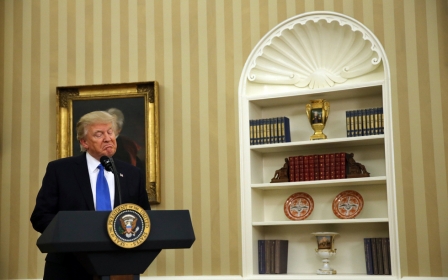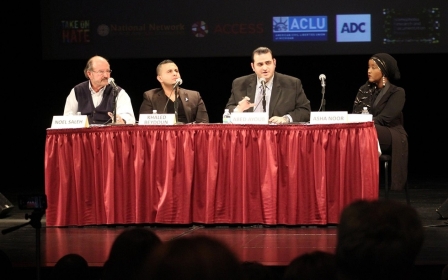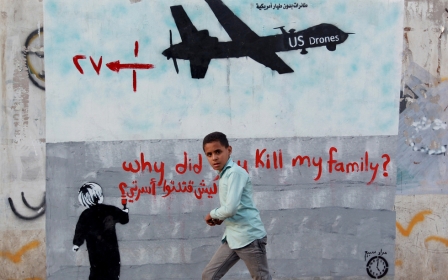Not everyone loses from Trump's Muslim ban
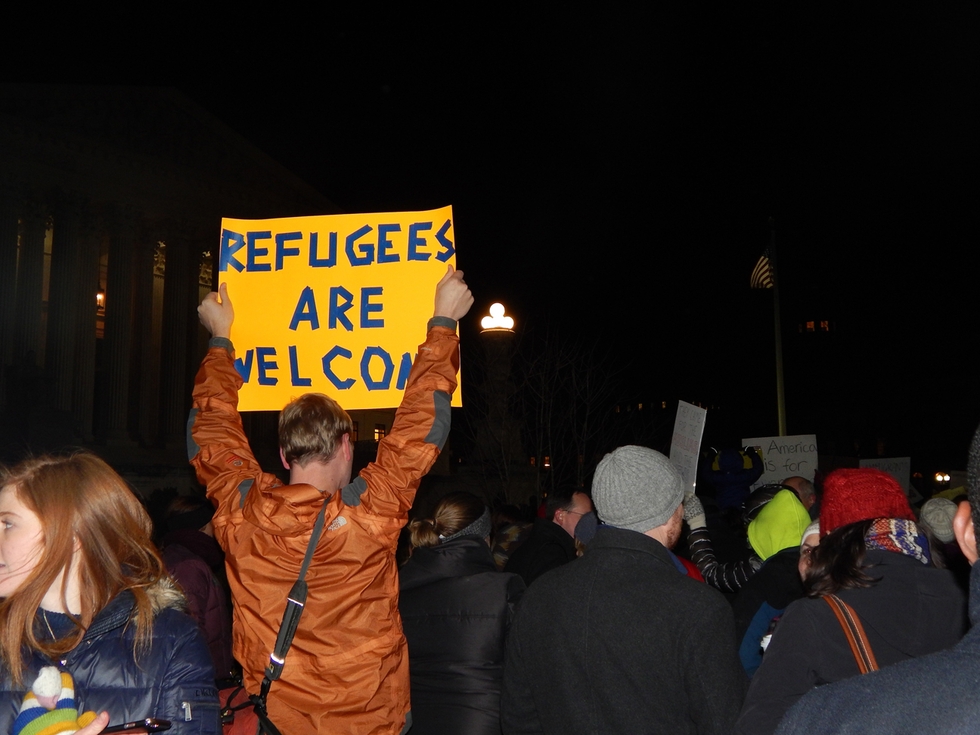
NEW YORK, United States – As the United States rolls out President Donald Trump’s new curbs on travellers from seven mostly-Muslim countries, would-be migrants, protesters and human rights activists have decried the visa rule changes as a form of collective punishment.
But, as with any policy, there are winners as well as losers. As the dust settles, members of persecuted religious minorities in the Middle East – such as Chaldeans, Yazidis and Baha’is – see Trump’s executive order as a way of getting coveted spots at the front of the refugee line.
“The Trump administration seems like a good team to work with,” Bishop Sarhad Jammo, a Chaldean Catholic leader originally from Baghdad, Iraq, who now lives in San Diego, California, told Middle East Eye.
“I’m concerned about the fate of some 100,000 Christians who are looking for resettlement. They are now in Jordan, Lebanon and Turkey. They have given up looking for solutions inside Iraq.”
While Trump’s 27 January order cut the number of US-bound refugees to 50,000 this year and temporarily halted any from Syria, it directed US officials to “prioritise” those from minorities facing “religious-based persecution”.
Speaking with the Christian Broadcasting Network the same day, Trump said Christians were “horribly treated” and merited special help.
The temporary ban on travellers from Iran, Iraq, Libya, Somalia, Sudan, Syria and Yemen has sparked protests. Some 49 percent of Americans support the effort, while 41 percent reject the move, according to a Reuters/Ipsos poll.
Trump’s priority for Christians has similarly vexed charities that resettle refugees. Decisions about who wins passage to the US should be based on life-or-death threats – not chiefly on an applicant’s faith, critics say.
The US State Department is nevertheless implementing Trump’s edict and must report to the White House on progress in May. The order “does not grant a preference to any one religion,” a department spokeswoman told MEE.
Muslim applicants from countries where they were a persecuted minority also stand to benefit, she added. It remains unclear whether a Shia Muslim suffering at the hands of a Sunni majority, or vice versa, would qualify.
“The US has a long history of resettling religious minorities, including Jews and Evangelical Christians fleeing the former Soviet Union; Baha’is, Jews, Christians and others fleeing Iran; Christians from Iraq; Muslims and Christians from Burma; and others,” she told MEE.
Bishop Jammo has long warned Washington of the suffering of his Chaldean brethren in Iraq, who faced burning and crucifixion by Islamic State (IS) militants, as well as getting caught up in Sunni-Shia bloodbaths.
But, he says, he “gave up” under former President Barack Obama’s administration, which “tilted” towards Muslim refugees. Now that Trump is in the Oval Office, he is “hopeful of some practical solutions”.
'Bittersweet'
Mark Arabo, from the Minority Humanitarian Foundation, a US-based charity, also lobbies US lawmakers to help Chaldeans. He has recorded 70,000 Chaldeans, Yazidis and others who fled the 2014 IS advance into northern Iraq and are holed up in its semi-autonomous Kurdish zone.
Benefiting from Trump’s pro-Christian largesse is “bittersweet,” he told MEE.
But the motivation for US-based Chaldeans is strong. Many wish to help friends and relatives reach a country with jobs, open schools and good hospitals, and to escape the dangers of Iraq or hardships in nearby Arab countries.
“Iraq’s religious minorities have no protection in the constitution and no representation in government. They are like sheep among different factions of wolves that are fighting for land. When you have a sheep among wolves, you save the sheep first,” Arabo told MEE.
Other minorities have similar concerns. Yazidis, a group that is ethnically linked to Kurds and practises a 4,000-year-old faith centred on the Peacock Angel, saw their men butchered and women turned into IS sex slaves.
'Iraq’s religious minorities have no protection in the constitution and no representation in government' - Mark Arabo
Pari Ibrahim, director of the Free Yezidi Foundation, a charity based in the Netherlands that helps freed IS sex slaves in the northern Kurdish zone, said Yazidis would ideally live “safely and peacefully in Iraq”.
“We do believe that the most desperate cases, such as those women and children who have escaped from IS captivity, should be granted resettlement abroad,” Ibrahim told MEE. “We expect the US and all developed nations to assist our most desperate survivors.”
The estimated 400,000 Yazidis of northern Iraq endured many horrors under the IS advance. The country’s Christians have suffered badly since the 2003 US-led invasion sent Iraq spiralling into inter-factional chaos.
In the 1990s, Iraq was home to as many as 1.4 million Christians, two-thirds of whom were Chaldean Catholics, in communion with Rome. Fewer than 250,000 remain today, according to estimates in the US government’s annual report on religious freedom.
Inter-religious killing raises harsh questions for minorities in the Middle East. Despite the violence, some are worried that all Christians, Yazidis and others will be forced to flee Iraq’s turbulence, wiping thousands of years of heritage off the map.
Chaldean Patriarch Louis Raphael I Sako of Baghdad said Trump’s policy of preferential immigration for Christians was a “trap” that would “create and feed” tensions with Muslims, according to the Catholic news agency Fides.
Faysal Itani, a Lebanese analyst who has advised US officials on Syria, said the suffering of Christians in the Middle East and refugee outflows will likely see populations dwindle ever-closer to zero.
“Those left behind as a community, they suffer, they grow smaller, they grow more marginal and that’s been happening in the Levante for a long time, particularly in Lebanon since the civil war began. I can very much see it happening now in Syria and Iraq,” Itani told MEE.
New MEE newsletter: Jerusalem Dispatch
Sign up to get the latest insights and analysis on Israel-Palestine, alongside Turkey Unpacked and other MEE newsletters
Middle East Eye delivers independent and unrivalled coverage and analysis of the Middle East, North Africa and beyond. To learn more about republishing this content and the associated fees, please fill out this form. More about MEE can be found here.


